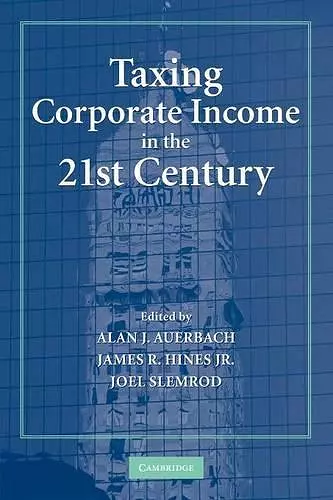Taxing Corporate Income in the 21st Century
Alan J Auerbach editor James R Hines, Jr editor Joel Slemrod editor
Format:Paperback
Publisher:Cambridge University Press
Published:29th Nov '12
Currently unavailable, and unfortunately no date known when it will be back
This paperback is available in another edition too:
- Hardback£99.00(9780521870221)

A state-of-the-art examination of the impact and wisdom of taxing corporate income, first published in 2007.
Most countries levy taxes on corporations, but the impact - and therefore the wisdom - of such taxes is highly controversial among economists. This 2007 book features state-of-the-art research that sheds light on these issues, and promises to inform the tax policy of the twenty-first century.This book was first published in 2007. Most countries levy taxes on corporations, but the impact - and therefore the wisdom - of such taxes is highly controversial among economists. Does the burden of these taxes fall on wealthy shareowners, or is it passed along to those who work for, or buy the products of, corporations? Can a country with high corporate taxes remain competitive in the global economy? This book features research by leading economists and accountants that sheds light on these and related questions, including how taxes affect corporate dividend policy, stock market value, avoidance, and evasion. The studies promise to inform both future tax policy and regulatory policy, especially in light of the Sarbanes-Oxley Act and other actions by the Securities and Exchange Commission that are having profound effects on the market for tax planning and auditing in the wake of the well-publicized accounting scandals in Enron and WorldCom.
In this book most of the top stars of public finance economics grapple with a series of issues surrounding the taxation of corporate income. These include, among others, the reactions of corporations to changes in the corporate tax rate, tha reactions of the market to changes in the tax on dividends, and the efforts of corporations ( by choosing their location, by their debt-finance decisions, and by other means) to reduce their tax liabilities. The authors do not reach a clear consensus, but expose the reader to the many facets (of theory, of hypothesis framing and testing, and of data analysis) that turn out to be important as one delves into this topic. These matters are profound, rich and challenging to professionals interested in public finance and corporate behavior. -- Arnold C. Harberger, University of California, Los Angeles
The corporate income tax has a long history of analysis and consideration by economists, going back to Harberger's pathbreaking work in the 1960's. Yet questions of its efficiency costs and incidence remain controversial today and crucial to U.S. policy discussions of capital formation, competitiveness, and wages and income distribution. This volume collects important new papers on the consequences of the double taxation of dividends, corporate taxation of multinational firms, and links between corporate taxation and corporate governance. The book should be read both by economists interested in capital income taxation and by policy analysts piecing together the role of corporate taxation in tax reform. -- R. Glenn Hubbard, Dean, Columbia Business School
Understanding the effects of the corporate tax is one of the central and most difficult elements of tax policy. This book provides a comprehensive analysis of the issue. Auerbach, Hines, and Slemrod have brought together the leading researchers in the field, many of them using new or unique data sets to understand the effects of taxing corporations. The analyses will help further the debate on corporate tax compliance, international competition, the effects of dividend taxation, and many other issues of central importance to tax reform and to our economy. -- David Weisbach, The University of Chicago
Anyone interested in the issues related to taxing corporate income will find this book well worth their time to read. As highlighted in many of the discussant comments, as many if not more questions are raised than answered in many of the papers and I believe the book will prove to be fertile ground for graduate students and others searching for important and timely research questions. -- Terry Shevlin, University of Washington
ISBN: 9781107411517
Dimensions: 229mm x 152mm x 23mm
Weight: 620g
424 pages